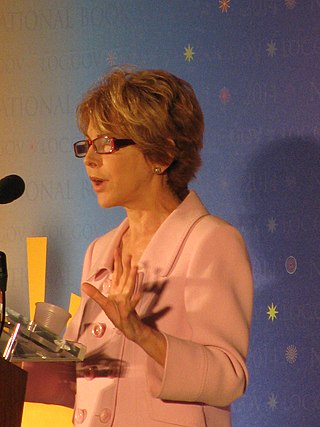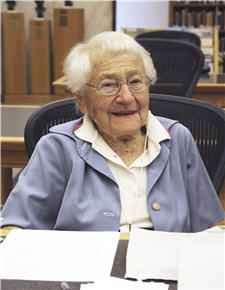Related Research Articles

Sally L. Satel is an American psychiatrist based in Washington, D.C. She is a lecturer at Yale University School of Medicine, a visiting professor of psychiatry at Columbia University, a senior fellow at the American Enterprise Institute, and an author.
Elissa Panush Benedek is an American psychiatrist specializing in child and adolescent psychiatry and forensic psychiatry. She is an adjunct clinical professor of psychiatry at the University of Michigan Medical Center. She served as director of research and training at the Center for Forensic Psychiatry in Ann Arbor for 25 years and was president of the American Psychiatric Association from 1990 to 1991. She is regarded as an expert on child abuse and trauma, and has testified in high-profile court cases. She also focuses on ethics, psychiatric aspects of disasters and terrorism, and domestic violence. In addition to her own books, book chapters, and articles, she has collaborated with her husband, attorney Richard S. Benedek, on studies of divorce, child custody, and child abuse.

Adolf Meyer was a Swiss-born psychiatrist who rose to prominence as the first psychiatrist-in-chief of the Johns Hopkins Hospital (1910-1941). He was president of the American Psychiatric Association in 1927–28 and was one of the most influential figures in psychiatry in the first half of the twentieth century. His focus on collecting detailed case histories on patients was one of the most prominent of his contributions. He oversaw the building and development of the Henry Phipps Psychiatric Clinic at Johns Hopkins Hospital, opened in April 1913, making sure it was suitable for scientific research, training and treatment. Meyer's work at the Phipps Clinic is possibly the most significant aspect of his career.

Carola Blitzman Eisenberg was an Argentine-American psychiatrist who became the first woman to hold the position of dean of students at Massachusetts Institute of Technology. From 1978 to 1990, she was the dean of student affairs at Harvard Medical School (HMS). She has for a long time been lecturer in the newly renamed Department of Global Health and Social Medicine at HMS. She was also both a founding member of Physicians for Human Rights and an honorary psychiatrist with the Massachusetts General Hospital in Boston, a longstanding position there.
Carl Compton Bell was an American professor of psychiatry and public health at the University of Illinois at Chicago. Bell was a National Institute of Mental Health international researcher, an author of more than 575 books, chapters, and articles addressing issues of violence prevention, HIV prevention, isolated sleep paralysis, misdiagnosis of Manic depressive illness, and children exposed to violence.
Judd Marmor was an American psychoanalyst and psychiatrist known for his role in removing homosexuality from the American Psychiatric Association's Diagnostic and Statistical Manual of Mental Disorders.

Jeffrey Alan Lieberman is an American psychiatrist who specializes in schizophrenia and related psychoses and their associated neuroscience (biology) and pharmacological treatment. He was principal investigator for CATIE, the largest and longest independent study ever funded by the United States National Institute of Mental Health to examine existing pharmacotherapies for schizophrenia. He was president of the American Psychiatric Association from May 2013 to May 2014.
The Indian Psychiatric Society (IPS) is the oldest professional association of psychiatrists in India. Founded during the 34th Indian Science Congress, IPS replaced the Indian division of the Royal Medico-Psychological Association.
Olga Maria Von Tauber was a psychiatrist and philanthropist, who served in the hospitals of Long Island, New York, United States.
Scientific and medical expert bodies have repeatedly concluded that abortion poses no greater mental health risks than carrying an unintended pregnancy to term. Nevertheless, the relationship between induced abortion and mental health is an area of political controversy. In 2008, the American Psychological Association concluded after a review of available evidence that induced abortion did not increase the risk of mental-health problems. In 2011, the U.K. National Collaborating Centre for Mental Health similarly concluded that first-time abortion in the first trimester does not increase the risk of mental-health problems compared with bringing the pregnancy to term. In 2018, The National Academies of Sciences, Engineering, and Medicine concluded that abortion does not lead to depression, anxiety, or post-traumatic stress disorder. The U.K. Royal College of Obstetricians and Gynaecologists likewise summarized the evidence by finding that abortion did not increase the risk of mental-health problems compared to women carrying an unwanted pregnancy to term. Two studies conducted on the Danish population in 2011 and 2012 analysed the association between abortion and psychiatric admission found no increase in admissions after an abortion. The same study, in fact, found an increase in psychiatric admission after first child-birth. A 2008 systematic review of the medical literature on abortion and mental health found that high-quality studies consistently showed few or no mental-health consequences of abortion, while poor-quality studies were more likely to report negative consequences.
Norman Sartorius is a German-Croatian psychiatrist and university professor. Sartorius is a former director of the World Health Organization's (WHO) Division of Mental Health, and a former president of the World Psychiatric Association and of the European Psychiatric Association. He has been described as "one of the most prominent and influential psychiatrists of his generation" and as "living legend"
Harvey John Tompkins, M.D. (1906–1983) was an American physician, a psychiatrist, whose professional life was in public service.
Melvin Sabshin, M.D. was an American psychiatrist, the medical director of the American Psychiatric Association from 1974 to 1997, and a leader in psychiatry placing it firmly within the discipline of medicine. He worked quietly within many groups and organizations to attain the changes he believed necessary to advance the profession of psychiatry.

Dr. Mildred Mitchell-Bateman, M.D. was an American physician and medical administrator. She was West Virginia's mental health commissioner in 1962, and was the first woman and first African-American to hold the position.
Jeanne Marybeth Spurlock was an American psychiatrist, professor and author. She served as the deputy medical director of the American Psychiatric Association for seventeen years. She chaired the Department of Psychiatry at Meharry Medical College starting in 1968, and she taught at George Washington University and Howard University. She also operated her own private psychiatry practice, and she published several works.

Lucy Dorothy Ozarin was a psychiatrist who served in the United States Navy. She was one of the first women psychiatrists commissioned in the Navy, and she was one of seven female Navy psychiatrists who served during World War II.

Judith L. Rapoport is an American psychiatrist. She is the chief of the Child Psychiatry Branch at the National Institute of Mental Health (NIMH), part of the National Institutes of Health (NIH) in Bethesda, Maryland.

Tamsin Jane FordCBE, FRCPsych, FMedSci is a British psychiatrist specialising in children's mental health. Since 2019 she has been based at the University of Cambridge where she is now Professor of Child and Adolescent Psychiatry, Head of the Department of Psychiatry and Fellow of Hughes Hall. She has been heavily involved with the Incredible Years Teacher Classroom Management (TCM) programme, created by Carolyn Webster-Stratton, which aims to raise and improve children's mental health in primary schools across Devon. Her work also ties in with the Strengths and Difficulties Questionnaire (SDQ), created by UK psychiatrist, Robert Goodman.
Maria A. Oquendo is an American psychiatrist. Oquendo is the chair of the Department of Psychiatry in the Perelman School of Medicine at the University of Pennsylvania. In 2016, she became the first Latina to be elected president of the American Psychiatric Association.
References
- ↑ "Declaration of Dr. Nada Stotland" (PDF). ACLU of North Carolina. Retrieved 10 June 2019.
- ↑ Howes, Ryan (10 December 2008). "Seven Questions for Nada Stotland". Psychology Today. Retrieved 18 March 2016.
- ↑ Yudofsky, SC (October 2009). "Nada Logan Stotland, M.D., 135th President, 2008-2009". The American Journal of Psychiatry. 166 (10): 1108–9. doi:10.1176/appi.ajp.2009.166.10.1108. PMID 19797443.
- ↑ "Dr Nada Stotland Joins Our Editorial Board". Physicians Practice. 13 July 2012. Archived from the original on 29 March 2016. Retrieved 18 March 2016.
- ↑ Born, Molly (4 October 2015). "State funds designated for groups that oppose abortion". Pittsburgh Post-Gazette. Retrieved 18 March 2016.
- ↑ Stotland, Nada (2 July 2013). "Women and Abortion: The Psychiatrist's Role". Psychiatric Times. Retrieved 18 March 2016.